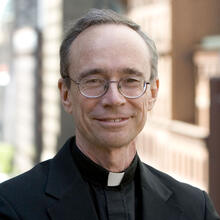(RNS) — When we listen to the resurrection stories during the Easter season, we often focus on what happened to Jesus: He is raised up from the dead, he goes through locked doors, he appears suddenly without warning to the disciples, he sits at the right hand of the Father.
But it’s probably more important to look at what the resurrection does to the disciples. They tell us what impact the resurrection should have on us.
In John’s Gospel, the first words of risen Jesus are “Peace be with you.” The first message of the resurrection is peace. The disciples had just seen their friend and leader arrested, tortured and crucified. They were heartsick, depressed, afraid and in despair. Today we would say they are suffering from PTSD — post-traumatic stress disorder.
Jesus comes and says, “Peace. Everything is OK.” The message of the resurrection is that no matter what happens to us, the Father will not let defeat and death be the end. He will raise us up just as he raised up Jesus from defeat to victory.
In John’s Gospel, the first words of risen Jesus are “Peace be with you.” The first message of the resurrection is peace.
But this peace is not a peace of stillness, it is not a peace of sleep. Immediately after wishing the disciples peace, Jesus says, “As the Father has sent me, so I send you.”
Peace is the first gift of the resurrection, but mission is the second. Jesus gives the disciples and us a mission: “As the Father has sent me, so I send you.”
As Christians we have today the same mission as Jesus had from his Father, to spread the good news of the Father’s love, of the Father’s compassion and mercy. Our mission, like that of Jesus, is to help establish the kingdom of God, a kingdom of justice, of peace and of love.
Like Jesus, we are to reach out to the alienated and the suffering. We are to feed the hungry, give drink to the thirsty, welcome the stranger, clothe the naked, house the homeless. That was the mission of Jesus; that is our mission as the presence of the risen Christ in our world. Added to that mission today is the mission to save the planet, God’s creation, from global warming.
The third gift of the resurrection is the Spirit. Jesus breathes on the disciples and says: “Receive the Holy Spirit.” In John’s Gospel, we do not have to wait for Pentecost. The Spirit is given on Easter Sunday.
It is the Holy Spirit that brings peace and confidence in God. It is the Holy Spirit that gives us courage to take up the mission of Jesus. It is the Holy Spirit that transforms us into the body of Christ. It is the Holy Spirit that inspires us with love for all of our brothers and sisters. It is the Holy Spirit that gives us the power to forgive each other’s sins.
We see the effects of the resurrection and the power of the Spirit lived out in the Acts of the Apostles.
It is the Holy Spirit that inspires us with love for all of our brothers and sisters. It is the Holy Spirit that gives us the power to forgive each other’s sins.
First, the early Christians were eager to be instructed in their faith. They listened to the stories about Jesus that eventually became the Gospels. They devoted themselves to the apostles’ instruction, as we can see in the letters of Peter and Paul.
Second, the early Christians devoted themselves to community life. They ate together. They enjoyed each other’s company; they talked to each other about their faith, their values, about what was important to them. They shared what they had. They helped each other. They were generous to those in need. They were welcoming.
Third, the early Christians devoted themselves to the breaking of the bread and to prayer. The breaking of bread was an early name for the Lord’s Supper, the Eucharist. It was celebrated in homes during a meal, just like at the Last Supper. The Christians said prayers modeled on those of the Jewish Passover meal, and they gave praise and thanks to God for the life and message of Jesus.
The apostle Thomas did not see Jesus on Easter because he was not with the community. He refused to believe those who had seen Jesus. But despite his doubts, despite his disbelief, he did not abandon the community of the disciples. When Jesus came again, he was there.
The example of Thomas shows us that doubts are a normal part of being a Christian, even after the resurrection. Thomas honestly admitted his doubts, he shared them with the other disciples, but he stayed with the community anyway. Nor did they kick him out because he doubted.
If he had left in disgust or if he had been kicked out, he would not have seen Jesus when he came a second time. That is a lesson for all of us in the church. If Thomas could have his doubts and stay, so can we. Part of being a Christian is living with mystery, living with things we do not understand.
Like the early disciples, we should devote ourselves as a community to the instruction of the apostles, we should share what we have with the needy, and we should pray and break bread together. In the breaking of the bread we acknowledge the presence of the risen Jesus, who is the source of our hope. We ask for his peace, we accept his mission, and we pray to be open to the Spirit. In the Eucharist we not only meet the risen Lord, we are transformed into his body so we can continue his mission in the world.








